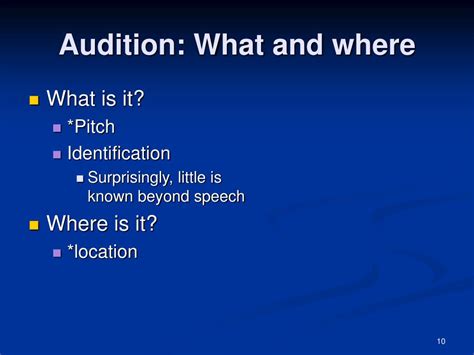Introduction
Audition, the process of hearing, is a complex and fascinating sense that plays a vital role in our perception of the world around us. From the gentle whisper of a loved one to the thunderous roar of a storm, sounds can evoke a wide range of emotions, memories, and behaviors. Psychology, the scientific study of behavior and mental processes, seeks to understand the intricate mechanisms underlying hearing, from the physical processes of sound waves to the cognitive processes of perception and interpretation.

Definition of Audition
In psychology, audition refers to the process of detecting, perceiving, and interpreting sound waves. It involves three main stages:
- Physiological reception: Sound waves entering the ear cause vibrations in the eardrum and ossicles, which then transmit these vibrations to the inner ear.
- Neural transduction: Vibrations in the cochlea are converted into electrical signals by specialized hair cells, which then send these signals to the auditory nerve.
- Cognitive processing: The auditory nerve carries neural signals to the brain, where they are processed and interpreted to create our conscious experience of sound.
Key Components of Audition
Several key components contribute to the process of audition:
- Sensitivity: The ability of the auditory system to detect faint sounds, measured in decibels (dB).
- Frequency range: The range of sound frequencies that the auditory system can perceive, typically from 20 Hz to 20,000 Hz (20 kHz).
- Localization: The ability to determine the direction from which a sound originates.
- Discrimination: The ability to distinguish between different sounds, such as speech sounds or musical notes.
- Loudness: The perceived intensity of a sound, influenced by both the physical amplitude of the sound waves and the sensitivity of the individual’s auditory system.
Applications of Audition
Audition has numerous applications, including:
- Communication: Sound is the primary means of human speech and communication, enabling us to convey complex messages and ideas.
- Navigation: Sounds, such as echoes and the directional cues in binaural hearing, help us navigate our surroundings and avoid obstacles.
- Entertainment: Music, movies, and other forms of entertainment harness the power of sound to evoke emotions, create memories, and provide enjoyment.
- Health monitoring: Auditory assessments can be used to diagnose hearing impairments, assess brain function, and detect cognitive decline.
Challenges and Pain Points
Despite the importance of audition, many people face challenges in this area:
- Hearing loss: Age-related hearing loss, noise exposure, and certain medical conditions can lead to partial or complete hearing loss.
- Tinnitus: A persistent ringing or buzzing in the ears, which can be highly distressing and interfere with daily activities.
- Auditory processing disorders: These disorders affect the brain’s ability to process and interpret sound signals, resulting in difficulties understanding speech, recognizing music, or localizing sound sources.
Motivations for Improving Audition
Various motivations drive individuals to improve their audition:
- Enhanced communication: Improved hearing enables better understanding of speech and reduces the need for repetition.
- Increased safety: Good hearing is essential for detecting warnings, alarms, and other sounds in our environment.
- Improved quality of life: Auditory experiences contribute significantly to our enjoyment of music, social interactions, and other activities.
- Early detection and intervention: Regular hearing screenings can identify hearing impairments and enable early intervention to mitigate their impact.
Effective Strategies for Improving Audition
Several effective strategies can improve audition:
- Hearing aids: Amplify sound signals to compensate for hearing loss.
- Cochlear implants: Surgical devices that bypass the damaged parts of the cochlea to stimulate the auditory nerve directly.
- Auditory training: Exercises designed to improve auditory skills, such as sound discrimination, localization, and speech perception.
- Lifestyle changes: Reducing exposure to loud noises, quitting smoking, and managing cardiovascular health can contribute to better hearing.
Common Mistakes to Avoid
To ensure effective audition improvement, it is crucial to avoid common mistakes:
- Ignoring early signs: Neglecting gradual or sudden hearing changes can lead to delayed diagnosis and treatment.
- Self-medicating: Using over-the-counter ear drops or antibiotics for hearing problems without consulting a healthcare professional can be dangerous.
- Overusing earplugs or headphones: Prolonged or excessive use of ear protection can contribute to hearing loss.
- Ignoring professional recommendations: Failing to follow the advice of audiologists or other healthcare professionals regarding hearing care can compromise results.
Conclusion
Audition, the sense of hearing, is a complex and fascinating aspect of human psychology and physiology. Understanding the mechanisms of audition, the challenges faced by individuals with hearing difficulties, and the strategies available for improving audition is crucial for maximizing our ability to experience and communicate in a sound-filled world.
